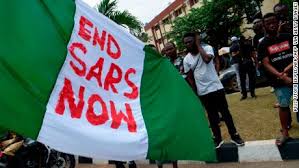SARS: Why is this notorious police unit the center of protest in Nigeria?
- Gen Z Collaborative

- Oct 28, 2020
- 3 min read
Updated: Jan 11, 2021
In this article, Nana Opare-Addo explains what exactly is SARS & why there is public outcry regarding this police unit.
*These photographs are a demonstration of the protests occurring in Nigeria, against police brutality.*
SARS Protest: What is SARS?
During October of 2020, many Nigerians have continued protesting against the infamous police unit- SARS. Originally developed as a twitter campaign, these protests have most recently been the center of growing controversy in Nigeria. Furthermore, mass mobilizations have proliferated as a result of the many abhorrent incidents regarding police brutality.
Formed in 1992, SARS (Special Anti-Robbery Squad) initially succeeded in lowering crime rates. The police unit performed undercover operations against crimes involving kidnapping, armed robbery, car stealing, firearms, and all sorts of spoliation. Most recently however, it seems as if SARS is performing the very action they are obligated to prevent. Fulani Kwajafa, a former police commissioner who developed SARS, claims that the police unit has “turned into banditry.”
Over the years, Nigerians have shared the many detestable incidents they have had with SARS; this includes the engagement of unlawful arrests, kidnapping, torture, murder, theft, and a variety of criminal activities. One witness to SARS brutality, Philomena Celestine, claimed that in 2018 she had been pulled over by SARS officers while traveling home. Philomena, in this interview, states “My four-year-old niece was in the vehicle but they cocked their guns at our car and drove my brothers into the bush where they harassed them for over 30 minutes, and accused them of being cybercriminals. They could see my graduation gown but that did not deter them. My sister was trembling and crying in fear.”
Like Philomena, tons of Nigerians have claimed to have had similar encounters with SARS. However, the (EndSARS) movement has experienced a revitalisation after numerous events.
A Brief History on SARS: What sparked the protests?
According to Amnesty International's 2016 report, SARS was responsible for abuse, cruelty, ignominy, and other forms of shame. For example, a 25-year old fuel attendant & victim stated, “The policemen asked me to sign a plain sheet. When I signed it, they told me I had signed my death warrant. They left me hanging on a suspended iron rod. My body ceased to function. I lost consciousness. When I was about to die they took me down and poured water on me to revive me.” Unfortunately, this SARS confrontation is only one out of the many incidents that transpired. Furthermore, Amnesty International’s 2020 publication indicated that there had been 82 documented cases, between January 2017 and May 2020, regarding abuse of power & murder by SARS. Despite all of these occurrences, two events in particular provoked the ongoing protests.
On October 3rd, 2020, a video surfaced on social media; this video displayed a SARS police officer shooting a young Nigerian man. Furthermore, it is alleged that the SARS officer stole the man’s vehicle. After the video surfaced rapidly online, many people began spreading awareness using the twitter hashtag “#ENDSARS.” However, the brutality didn’t end there. If the police unit wasn’t already in hot water, another report surfaced online regarding the killing of Daniel Chibuike. According to an eye witness, the SARS men shouted the word “thief” before shooting Daniel in a supermarket. As a result of these two incidents, along with previous conflict, many people took to the streets on October 8th, 2020 to protest against the police brutality in Nigeria.
Protests & Effect Change: What’s next?
After weeks of public outcry & commotion, over the many examples of SARS brutality, a deluge of nation-wide protests began. During October 8th, 2020, many of Nigerian youth, activists, and celebrities led these protests. However, violence wasn’t improbable. The Nigeria Police Force tried to prohibit the continuation of these protests by shooting, throwing tear gas, and using water cannons at unarmed, peaceful protesters. As a result of these disruptions, many people were wounded and some were even killed. However, this did not discourage the public from continuing to protest. By October 14th, 2020, the protests were only proliferating...and so was the desire to repeal SARS.
President Muhammadu Buhari expressed his opinion on SARS by stating, “The disbanding of SARS is only the first step in our commitment to extensive police reform in order to ensure that the primary duty of the police and other law enforcement agencies remains the protection of lives and livelihood of our people.” In terms of action, the Inspector-General of Nigeria Police has banned the Federal Special Anti-Robbery Squad (FSARS). Furthermore, tactical units such as the Special Tactical Squad, Anti-Cultism Squad, and Intelligence Response Team, to help monitor the protests. However, the protests still continue in Nigeria, as hopes of disbanding SARS pervade among all Nigerians.
Sources:







Comments